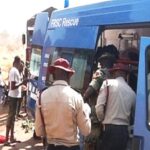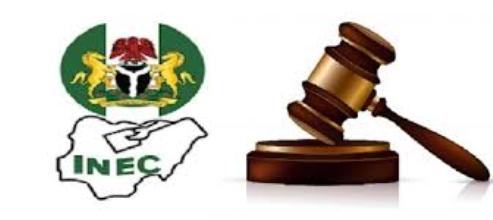LAGOS JUNE 9TH (NEWSRANGERS)-Two subpoenaed witnesses of the Peoples Democratic Party (PDP) and its candidate, Atiku Abubakar, yesterday, admitted at the Presidential Election Petition Court (PEPC) that the Bimodal Voter Accreditation System (BVAS) failed to transmit the results of the election after the collation.
In their joint petition before the PEPC, Atiku and PDP acussed the Independent National Electoral Commission (INEC) of installing a third-party device to “manipulate” results of the February 25 poll in favour of ruling All Progressives Congress (APC) and its candidate, Bola Tinubu.
On Thursday, the witnesses, Friday Egwuma and Grace Timothy both ad-hoc staff of the Independent National Electoral Commission (INEC) said the BVAS machine allocated to them developed system error afterthe results of the Senate and House of Representatives aspects of the poll were freely transmitted.
In their subpoena evidence, the two workers of the electoral body explained that they had to resort to other means of getting the results when it became clear that the BVAS machines would not help them.
However, their testimonies came amid objections raised by President Bola Tinubu and the All Progressives Congress, APC.
Egwuma was a Presiding Officer in a polling unit in Abia State while Grace Timothy served INEC in Plateau State.
Besides the failure of the BVAS machines to transmit the presidential election results, the two witnesses who were led in evidence by counsel to the petitioners, Chief Chris Uche, admitted that voting went smoothly in their respective places of work.
Under cross-examination by Mr Abubakar Mahmud, who stood for the electoral body, Egwuma explained that he resorted to an offline system in place of the BVAS machines.
In her own testimony, Grace Timothy told the Court that the greatest challenge she experienced during the election was the uploading of the presidential election results into the I- rev portal.
The witnesses were also cross-examined by Chief Wole Olanipekun SAN who stood for President Bola Ahmed Tinubu and Prince Lateef Fagbemi SAN who represented the All Progressives Congress APC.
Meanwhile, the court has reserved ruling to the objections raised against the evidence of the witnesses.
President Tinubu and the APC had in their objections argued that the statements of the ad-hoc workers were not front loaded at the time of filing the petition.
Wole Olanipekun, who appeared for Tinubu cited several provisions of the law against the use of the witnesses arguing that since they were subpoenaed by Atiku as the petitioner, he ought to have front loaded their statements on oath along with the petitition.
His argument was adopted by counsel to APC, Lateef Fagbemi, who insisted that their statements contravened the provisions of the Electoral Act, 2022.
In their petition marked CA/PEPC/05/2023, Atiku and the PDP listed INEC as 1st respondent, APC as 2nd respondent and Tinubu as third respondent.
According to Atiku, the said IT Consultant, Suleiman Farouk, ensured that the device was intermediated between the Bimodal Voter Accreditation System (BVAS) and the INEC Result Viewing (IReV) Portal, known as Device Management System (DMS).
He told the court that the DMS was the software that allowed INEC’s IT Security Consultant, Farouk, remotely control, monitor and filter data transmitted from the BVAS devices to the electronic collation system and the IReV platform.
He told the court that the DMS was the software that allowed INEC’s IT Security Consultant, Mr. Farouk, to remotely control, monitor and filter data transmitted from the BVAS devices to the electronic collation system and the IRev platform.
Sun News Online











